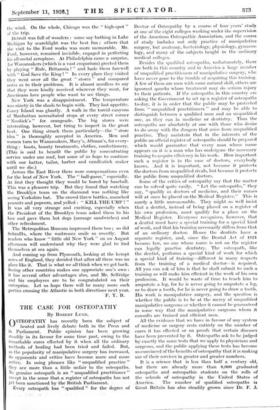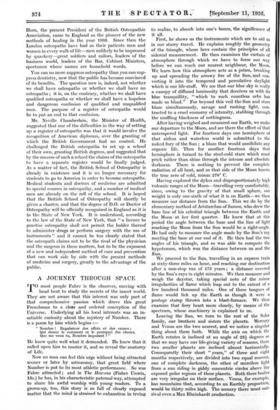THE CASE FOR OSTEOPATHY
By ROBERT LYND.
OSTEOPATHY has recently been the subject of heated and lively debate both in the Press and in Parliament. Public opinion has • been growing steadily in its favour for some time past, owing to the remarkable cures effected by it when all the ordinary methods of healing had been tried and failed. But, as the popularity of manipulative surgery has increased, its opponents and critics have become more and more active. In using phrases like " unqualified practice " they are more than a little unfair to the osteopaths. No genuine osteopath, is an " unqualified practitioner" except in the sense that a register of osteopaths has not yet been sanctioned by the British Parliament. - Every osteopath has "qualified " for the degree of Doctor of Osteopathy by a course of four years' study at one of the eight colleges working under the supervision of the American Osteopathic Association, and the course of study includes not only practice of manipulative surgery, but anatomy, bacteriology, physiology, gynaeco- logy, and many of the subjects taught in the ordinary medical colleges.
Besides the qualified osteopaths, unfortunately, there are both in this country and in America a large number of unqualified practitioners of manipulative surgery, who have never gone to the trouble of acquiring this training. A few of them are men with some natural skill, others arc ignorant quacks whose treatment may do serious injury to their patients. If the osteopaths in this country arc asking the Government to set up a register of osteopaths to-day, it is in order that the public may be protected from " unqualified practitioners " and may be able to distinguish between a qualified man and an unqualified one, as they can in medicine or dentistry. Thus the osteopaths are absolutely at one with those who desire to do away with the dangers that arise from unqualified practice. They maintain that in the interests of the public an official register of osteopaths should be prepared which would guarantee that every man whose name appears on it is a man who has undergone the necessary training to acquire efficiency in his work. How important such a register is in the case of doctors, everybody knows. And it is important, not because it protects the doctors from unqualified rivals, but because it protects the public from unqualified doctors.
Some of the critics of osteopathy say that the matter can be solved quite easily. " Let the osteopaths," they say, " qualify as doctors of medicine, and their names will at once be placed on the Medical Register." This is surely a little unreasonable. They might as well insist that a dentist, instead of being placed on a register of his own profession, must qualify for a place on the Medical Register. Everyone recognizes, however, that a dentist must have a special training for a special kind of work, and that his training necessarily differs from that of an ordinary doctor. Hence the dentists have a separate register, and, since the Dental Act of 1921 became law, no one whose name is not on the register can legally practise dentistry. The osteopath, like the dentist, performs a special kind of work for which a special kind of training—different in many respects from the training of a medical doctor—is required. All you can ask of him is that lie shall submit to such a training as will make him efficient in the work of his own profession. It would be waste of time to teach him to amputate a leg, for lie is never going to amputate a leg, or to draw a tooth, for he is never going to draw a tooth. His work is manipulative surgery, and the question is whether the public is to be at the mercy of unqualified. manipulative surgeons or whether it cannot be guaranteed in some way that the manipulative surgeons whom it consults are trained and efficient men.
All the evidence that we have in favour of any system of medicine or surgery rests entirely on the number of cures it has effected or on proofs that certain diseases have been prevented by it. Osteopaths ask to be judged by exactly the same tests that we apply to physicians and surgeons, and the public applying these tests has become so convinced of the benefits of osteopathy that it is making use of their services in greater and greater numbers.
It is a science that is less than half a • century old, but there are already more than 8,000 graduated osteopaths and osteopathic students on the rolls of the schools of osteopathy in the United States of America. The number of qualified osteopaths .ia Great . Britain has •elso steadily grown since -Dr. F. • Je Horn, the present President of the British Osteopathic Association, came to England as the pioneer of the new methods of healing in the year 1903. Since then the London osteopaths have had as their patients men and women in every walk of life—men unlikely to be impressed by quackery—great soldiers and sailors, leaders of the business world, leaders of the Bar, Cabinet Ministers, sportsmen whose names are household words.
You can no more suppress osteopathy than you can sup- press dentistry, now that the public has become convinced of its benefits. The question now is, indeed, not whether we shall have osteopaths or whether we shall have no osteopaths ; it is, on the contrary, whether we shall have qualified osteopaths or whether we shall have a hopeless and dangerous confusion of qualified and unqualified men. The purpose of a register of osteopaths would be to put an end to that confusion.
Mr. Neville Chamberlain, the Minister of Health, suggested that one of the difficulties in the way of setting up a register of osteopaths was that it would involve the recognition of American diplomas, over the granting of which the British Government had no control. He challenged the British osteopaths to set up a school of their own, granting British degrees, and suggested that by the success of such a school the claims of the osteopaths to have a separate register would be finally judged. As a matter of fact, the British Scheel of Osteopathy is already in existence and it is no longer necessary for students to go to America in order to become osteopaths. Medical students and doctors of medicine are admitted to special courses in osteopathy, and a number of medical men are already on the roll of the school. It is hoped that the British School of Osteopathy will shortly be given a charter, and that the degree of D.O. or Doctor of Osteopathy will be officially recognized in England as it is in the State of New York. It is understood, according to the law of the State of New York, that " a licence to practise osteopathy shall not permit the holder thereof to administer drugs or perform surgery with the use of instruments " and it cannot be too clearly stated that the osteopath claims not to be the rival of the physician and the surgeon in these matters, but to be the exponent of a new and independent method of cure and prevention that can work side by side with the present methods of medicine and surgery, greatly to the advantage of the public.







































 Previous page
Previous page